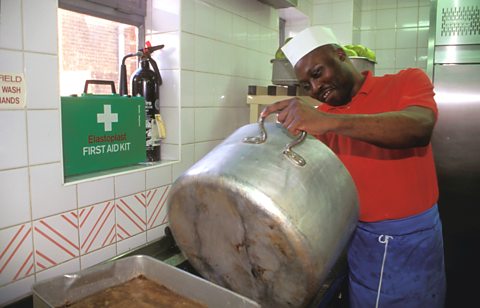Racial inequality
The main ethnic minorities in the UK have family backgrounds in Commonwealth countries such the Indian sub-continent, the West Indies and parts of Africa. Most non-white Britons were born in this country.

Despite many years of legislation, non-white citizens still encounter discrimination and even hostility. On average they have lower incomes, higher unemployment and are more likely to live in overcrowded accommodation than the white majority population.
Although the law bans racial discrimination, people from ethnic minorities are more likely to live in poverty. Despite this, in Scotland people from ethnic minorities do well in education with people of African, Caribbean, Indian, Pakistani and Chinese backgrounds outperforming white pupils at National 4, 5 and Higher level. In the UK, more people from minority backgrounds go to university than whites.
However, after graduating from university, many people from minorities are less likely to be employed, and likely to be earning less money if they are employed, than their white peers. UK Government figures show between 2019 and 2021 an average of 79% of Bangladeshi households were in the two lowest income quintiles (after housing costs were deducted) - this was the highest percentage out of all ethnic groups.
Cultural factors, such as religion and language can make it harder for some groups to gain employment or participate in some aspects of UK society.
There are many differences between ethnic minority groups. Some Asian groups, such as people with Indian and Chinese backgrounds, tend to be better off than people of Afro-Caribbean descent as they are more likely to own businesses and have professional qualifications. For example, the Scotland Census survey found in 2021 that the African ethnic group was more qualified than others - 55.1% of people aged 16 and over in the African group had a university or professional qualification, compared with 29.0% of the White Scottish group.
Relations with police
Relations between the police and some minority communities have been difficult. The police have problems recruiting from these communities despite programmes designed to improve the very low percentage of Asian and black officers. For example, Police ScotlandÔÇÖs Equality, Diversity and Inclusion Strategy 2022-26.
Equality and Human Rights Commission (EHRC)
In 2007 the Equality and Human Rights Commission (EHRC) combined the work of the Equal Opportunities Commission, the Commission for Racial Equality and the Disability Rights Commission. The EHRC works to eliminate discrimination, reduce inequality and protect human rights so everyone has a fair chance to participate in society. It also has the responsibility for other aspects of equality: age, sexual orientation and religion or belief, as well as human rights.
The Equality Act 2010Government policy to tackle discrimination. was passed in October 2010. It was introduced to strengthen discrimination legislation in all its forms and thus make Britain a fairer place. It replaced nine major pieces of legislation dating back to the Equal Pay Act (1970) and Discrimination Act (2005).